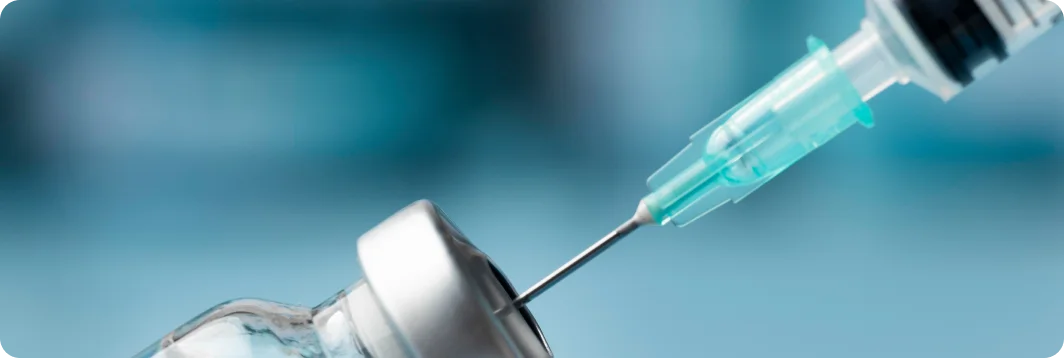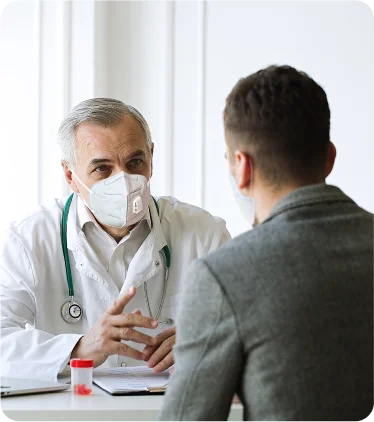Let us Help
It may be surprising to learn about the prevalence of this issue. According to a major study, about 24% of men over the age of 30 suffer from low testosterone.1
If you’re suffering from one or several of these concerns, it’s time to figure out if your T levels may be the source. While many factors can contribute to symptoms like these, an expert physician can help you determine how much your testosterone levels may be playing a part, and then offer you a customized Testosterone Replacement Therapy (TRT) treatment plan.

When it comes to hormone replacement, an intricate knowledge of the complex interplay between testosterone, other major hormones, and blood work is critical. Our staff has a longstanding history of comprehensive hormone replacement therapy and can help you navigate through the whole process, while prioritizing your safety and success.
Get the Right Diagnosis
If you’ve noticed from the above description, the symptoms related to low testosterone can feel vague. When investigating just how much impact testosterone levels may be having, it’s imperative that you’re assessed by an experienced physician who can perform a thorough assessment and synthesize all the information related to your history, physical findings, and lab work to understand the proper source of your complaints and come up with a unique treatment plan.
Choose the Best Treatment for You
Therapy with TRT does not always mean needles. In recent years, many different routes of administration have been developed, including gels, patches, nasal sprays, and pellets. Each of these options have their own pros and cons, so we’ll work with you to determine what works the best for your body and lifestyle. And since treatment is typically long-term, we’ll be here to help you manage it every step of the way.
The Process
Why MAXIM?
We are a leader in men's health services, and we can prove it! Here are 8 reasons to choose MAXIM.
We offer a wide array of men's health services under one roof, so you can continue working with the same trusted providers as your needs evolve. Plus, we consistently invest in the latest male enhancement and hair transplant technologies. Count on us to consistently give you the highest level of care available.
Many of our procedures are unique and customized and may not be available elsewhere. They were developed and honed by expert physicians over a decade or more. Furthermore, each procedure can be customized to your needs and condition.
Incredible results begin with extraordinary physicians. Work with proven leaders in the field of men's health. Our clinicians have decades of experience, extensive hospital experience, numerous research successes, and thousands of happy patients.
We specialize in men's health, male cosmetic surgery, men's sexual health, and hair transplants. That's all we do, and we do it well.
Our doctors and clinicians offer surgical and non-surgical procedures that are tailored to your needs, goals and health.
We do everything we can to keep your medical costs as low as possible. We also offer 0% financing to keep the costs accessible to you. You can apply for financing at your nearest MAXIM location. Plus, our prices are transparent.
MAXIM Men’s Health is growing and we have nearly 20 locations in the U.S. and abroad. We couldn't do that if our past clients hadn't been happy with our services.
Your initial, discrete consultation is complimentary. It's a great opportunity to discuss your situation, needs, concerns, and goals!

LOW TESTOSTERONE
Pros of Testosterone Replacement Therapy
After beginning TRT, you're likely to experience significant relief from your symptoms, including improved erection quality, libido, energy levels, and an improved ability to obtain muscle mass and lose fat, among many other benefits. Patients are often surprised by not realizing how poor they were previously feeling!
FAQs
On an individual level, there are many known factors which could contribute to decreased testosterone production, including aging, specific hormonal disorders, chronic illnesses like obesity, diabetes, or kidney disease, testicular trauma, the use of certain medications, diet, various sleep disturbances like sleep apnea, stress/fatigue. More rarely things like pituitary tumors, certain genetic diseases, or radiation/chemotherapy may be the source. While these are rare, the signs are important to assess for.
At the population level, it is interesting to note that decades of research have shown a gradual decline in testosterone across all ages from what used to be a higher average - this is an effect seen even in younger men.2, 3 The reasons for this are not yet fully understood.
This is a great question, because asking it reveals an important principle in medicine, which is that you don’t treat a number - you treat a person. That may sound obvious on its face, but the mistake that’s often made is a patient may want to “fix” their T levels when they are asymptomatic. Or, conversely, a patient with a testosterone level within what many would consider a “normal” range may not want treatment despite the fact that their body is showing obvious signs of low testosterone.
The American Urology Association generally considers a Total Testosterone level below 300 ng/dL to be obvious and diagnosable hypogonadism (i.e., low testosterone).4 This is a rough number and should be used alongside Free Testosterone, Sex Hormone Binding Globulin (SHBG), and other lab levels to form a more complete picture of your hormonal health.
While the “300” number is the most cited and generally accepted, studies make the point that it likely isn’t specific enough for various age ranges, 5 and research varies broadly on whether that number is an appropriate cut-off. 6, 7 You might be starting to notice that the “normal” range is dying the death of a thousand qualifications. This is why it is critical to work with a physician who not only has an intricate understanding of the current science, but also your body’s unique presentation.
Some supplements have been shown to have a positive effect on testosterone, but research findings have generally been inconsistent. Further, even when positive findings have been discovered, they generally show only a mild effect on testosterone levels, 8 especially when compared to the immediate and potent effect of TRT.
Even further, research studies are usually conducted in relation to specific compounds, but supplement companies typically do not sell supplements in the form of the solitary ingredients that were studied, but rather in the form of a “proprietary blend.” These blends typically don’t inform the consumer of how much of the desired ingredient exists, to what level of quality it has been produced, and what form of the ingredient has been used. Contrast this with TRT, where the dosing, format, and formulation have a required level of transparency due to federal pharmaceutical regulatory standards.
Certain prescribed medications like clomiphene and tamoxifen have been used to increase testosterone levels. These work differently than TRT in that they encourage the body’s own systems to produce more testosterone. The effects of these medications are typically milder than TRT, and in many cases may only work for a short while, with other unintended hormonal effects. For patients interested in this as a treatment option, we are happy to work with you to determine if this is a viable option in your context.
The most important element to candidacy is not only to be clinically diagnosed with low testosterone levels via lab work, but to also be symptomatic. There are some finer points to figuring this out, so working with a physician who can obtain a targeted history with relevance to these complaints is critical.
When it comes to hormone replacement, genetics play a big part. Some patients experience pronounced responses to starting doses right away (these are commonly referred to as “hyper-responders”), while others may require gradual increases in the dosage over several months to obtain the desired effect, both in reference to blood levels and symptoms. Typically, some level of effect on symptoms is seen within the first week by most patients.
Testosterone itself is not produced in isolation, but as part of a larger, multi-hormone system called the “hypothalamic–pituitary–gonadal axis,” or GnRH axis, which regulates the levels of luteinizing hormone (LH) and follicle-stimulating hormone (FSH), which are used by the testicles to make testosterone. Estrogen levels (which are actually vital in men within the right range) and prolactin levels may also be impacted by TRT. When selecting a provider to manage your TRT, you must consider finding someone who understands how to manage all of these hormones in harmony with one another.
As with any medical intervention, there are some risks associated with TRT. Among these are the risk for infertility, decreased sperm production, testicular atrophy, prostate cancer, negative cardiovascular outcomes (especially if there are pre-existing heart conditions), and a risk for blood clots, among others.
It should be known that the research on the long-term risk profile of testosterone therapy is debated in available medical literature - some argue that it may have a negative impact on life expectancy and cardiovascular outcomes, while others argue that it may actually decrease all-cause mortality. Your actual outcomes are likely to depend heavily on your physician’s domain expertise and the ongoing monitoring of your blood work.
Certainly! However, as TRT affects your normal hormone levels and the systems that regulate them, it is important to do this in a measured way to avoid rapid withdrawal effects. Sometimes, we offer short-term additional medications to help your hormone levels re-adjust. A calculated approach to stopping TRT can help mitigate withdrawal symptoms.
Taking TRT has the expected effect of lowering your body’s natural production of testosterone. After ceasing TRT, many patients return to baseline, but some do experience a long-lasting suppression in their hormone levels after therapy. Again, this can be sometimes be mitigated with other therapies.
One of the things that happens when you supplement with testosterone in order to return to normal levels is that your body suppresses its own internal production of testosterone. Since the internal production of testosterone is one of the key elements in sperm production and maturation, men who take exogenous (ie., from “outside the body”) testosterone typically see their sperm count and quality drop, along with semen volume. Typically, these return after ceasing TRT, though this is not guaranteed.
SCHEDULE AN APPOINTMENT
Your MAXIM location will call you to schedule an appointment within 24 business hours of receiving this message.
